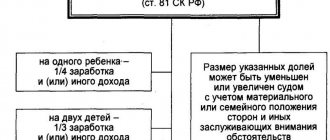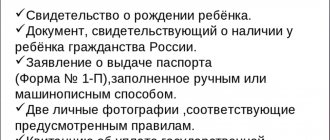Is it possible to apply for alimony while married?
If you have not officially divorced your spouse, this does not prevent the collection of alimony from him. Current Russian legislation allows for the collection of money for the maintenance of family members without taking into account their legal or actual family relations - p. 5 IC RF.
In what cases can you apply for alimony without divorce?
Family law regulates the alimony obligations of family members:
- Children and parents - ch. 13 IC RF.
- Spouses - Ch. 14 RF IC.
In both cases, a divorce is not required. The main condition for recovery here is the absence of an agreement on the payment of alimony and voluntary maintenance:
- On the part of the parent in relation to the child - clause 2 of Art. 80 IC RF.
- On the part of the spouse regarding his/her wife or husband, respectively - clause 2 of Art. 89 RF IC.
In the second case, additional legal conditions for recovery are:
- The best financial situation of the potential alimony payer.
- Simultaneous disability and neediness of the applicant.
- The pregnancy period and 3 years from the birth of each of the common children.
- The need of an applicant caring for a joint disabled child until the latter reaches 18 years of age or indefinitely in the case of caring for a joint disabled child from childhood of group 1.
Moreover, the first condition is present in any situation, and the subsequent ones are variable.
Is it possible to apply for alimony in marriage without divorce for 2 children?
Family law provides for the obligation of both parents to support all their common minor children - Art. 80 IC RF. If one of the parents evades the voluntary fulfillment of such duties, then the second spouse has the right to resort to forced collection of money for the maintenance of the child. That is, to collect alimony.
Parents themselves decide how and in what form to provide maintenance to their children. This could be the provision of cash or in-kind assistance - the purchase of food, clothing, things, etc. They also have the right to enter into an agreement on the maintenance of their children (agreement on the payment of alimony) - Ch. 16 IC RF.
How many children the spouses have in this case also does not matter. Simultaneous collection of alimony for an unlimited number of children is allowed.
Is it possible to apply for alimony if the husband does not officially work?
If the spouse does not work at all or does it unofficially, it is still permissible to collect alimony from him. Lack of a source of income is not a legal basis for avoiding supporting your needy and disabled relatives.
However, in this case, this is done exclusively by way of claim proceedings.
The alimony itself is assigned in a fixed amount.
Is it possible to apply for alimony in a civil marriage?
If paternity of a child is established, then collecting money for his maintenance will not be difficult. If it has not been established, then the first thing to do in such circumstances is to prove paternity. It is permissible to simultaneously go to court to establish paternity and collect child support.
But it will not be possible to recover money from a woman for her maintenance, since the law stipulates the social status of the applicant: wife, that is, official spouse - Art. 89 RF IC.
Amount of alimony for spousal support
How to justify alimony for spousal support?
- the woman’s financial viability;
- the level of monthly income of the former head of the family;
- the presence of other minor children whose upbringing and education the mother is involved in;
- guardianship of a woman over elderly relatives, orphans and incapacitated parents;
- spouse in need of constant financial assistance.
Just as a woman can act as a guardian for an orphan or a disabled child, a man can have responsibility to “special” members of society. Financial insolvency combined with guardianship over other people gives the spouse the right to demand alimony from his ex-wife.
In court, the fact of recognizing a man as needy, checking the legality of guardianship and the fact of divorce of the spouses is carried out. After documentary confirmation of each of the processes, a decision is made to help the man and the amount of alimony to be paid by the woman is determined - collection of alimony for the spouse (about
What is the procedure for applying for alimony during marriage?
The procedure for filing a claim and the documents attached to it is the same in all available cases.
The applicant must adhere to a certain algorithm of actions:
- Select the collection procedure.
- Decide on the place and method of contact.
- File a claim or application for a court order. For a notarial agreement, it is enough to contact the notary orally. Sometimes an appointment is required in advance.
- Generate the appropriate package of documents.
- Submit an application or claim to the court or come to the notary on the appointed day.
It is possible to hire a representative to submit documents and represent interests.
What do you need to file for child support while married?
If the father refuses to enter into a child support agreement, then child support is collected through the court. To force the collection of funds, a written statement from one of the spouses that the other does not participate in the maintenance of their common child is sufficient.
If the defendant does not prove otherwise in court, the court will satisfy the stated demands, since supporting children is a responsibility, not a right of parents.
Why is a corresponding statement of claim or application for a court order filed? The last option is very unreliable, since the potential payer has the right to file objections regarding its execution within 10 days from the receipt of the court order. After which the judge will immediately cancel the order he previously issued.
What is needed to apply for alimony in a marriage without a divorce when the parents live separately
When spouses live separately, it is even easier to justify the legality of demands for forced collection of money for the maintenance of common children. It is enough to indicate this fact in the application. Otherwise, the judicial procedures are identical.
What is required to apply for alimony for a pregnant wife?
In order for a pregnant woman to apply for alimony for her own maintenance, she must:
- The presence of an officially concluded marriage (present or past) with the defendant.
- Refusal of the husband to voluntarily provide for his wife.
- Carrying a joint child.
- The financial ability of the defendant to provide material assistance to the plaintiff.
What is needed to apply for alimony for a disabled wife
In this case, confirmation is required:
- The presence of an official marriage (current or past period of time) with the defendant.
- Disability and need of the applicant.
- The financial ability of the defendant to provide assistance to the plaintiff.
- Refusal of the second spouse to voluntarily support his wife.
What is needed to apply for alimony for a wife caring for a disabled child?
In this situation, you will need to confirm:
- The presence of a marriage union.
- Disability of a child not older than 18 years or status of a disabled person from childhood of group 1.
- The applicant's need.
- The financial ability of the defendant to financially assist the plaintiff.
How to choose a collection procedure
The method of collecting funds for one’s own or children’s maintenance is determined primarily by the presence or absence of the husband’s consent to pay alimony. If your spouse does not mind providing you with money to support you or a common child, then you can invite him to enter into a child support agreement.
For certain reasons, some men do not agree to such a step or simply do not find the time to visit a notary. In this case, the next acceptable option is to apply for a court order. This is most suitable for those whose husbands have an official income. In any case, alimony here will be in shared format.
Legal action is selected if there are:
- Dispute between spouses.
- Obvious disagreement of the other party to pay alimony.
- Circumstances requiring proof.
- Irregular income of the defendant.
- He has no official income at all.
- The impossibility of collecting funds in a shared ratio without damaging the interests of the parties to the process.
- Receiving wages (at least in part) by the husband in kind.
- Whether he earns money in foreign currency.
Important! The issuance of a court order for the maintenance of a wife is not provided for by law at all.
What other methods are there for collecting alimony?
The legislation of the Russian Federation allows several methods of collection. In addition to the above, forced collection is possible if there is a previously concluded alimony agreement. If the spouse evades payment, the document is submitted for forced collection by filing at the husband’s place of work or through the FSSP at his place of residence.
The agreement has the force of a writ of execution. Each case has its own procedural nuances.
Where to apply for alimony during marriage
A woman with whom a child lives, when collecting alimony for him, has the right to go to court both at the address of the defendant and at her place of residence - Art. 29 Code of Civil Procedure of the Russian Federation.
She must apply for the collection of alimony for her maintenance at the place of residence of the defendant - Art. 28 Code of Civil Procedure of the Russian Federation.
If his place of residence is unknown or he does not have a place of residence in the Russian Federation, then he files a claim in court at the location of the spouse’s property or at his last known place of residence in Russia - Art. 29 Code of Civil Procedure of the Russian Federation.
The issuance of a court order is carried out in the same place, but in a simplified manner.
Attention! It is advisable to obtain a court order only when there is no dispute between the parties, since such a judicial act is very easy to cancel. In this case, the time to obtain it will be wasted.
Also, the judge has the right to refuse to accept an application if, from its text or attached documents, it appears that there is a dispute about the law - Art. 125 Code of Civil Procedure of the Russian Federation.
If the spouses decide to pay and receive alimony within the framework of an appropriate written agreement, then they turn to a notary to draw it up.
Important! Since alimony for the maintenance of a spouse is collected only in a fixed amount of money, it will not be possible to apply for it through writ proceedings at all - Art. 122 Code of Civil Procedure of the Russian Federation.
Which court to file for spousal support?
Work schedule and signboard of the Presnensky District Court of Moscow.
An application in the manner of claim proceedings is submitted to the district (city) court - Art. 24 Code of Civil Procedure of the Russian Federation. In order to obtain a court order, they apply to the magistrate's court.
How to apply for alimony while married
When the documents are fully prepared and properly executed, they are submitted to the court:
- Personally.
- Through a representative. In this case, a power of attorney is added to the general list of documents.
- By mail.
- In electronic format.
Any legally capable person over 18 years of age, whose powers are confirmed by an appropriate power of attorney, is allowed to act as a representative in civil proceedings - Art. 49 Code of Civil Procedure of the Russian Federation. However, turning to practicing lawyers for these purposes is more advisable, since the latter have not only special knowledge in the field of jurisprudence, but also valuable experience in participating in such trials.
This means that they know all the intricacies and nuances of civil legal procedures. Which will save you your time.
Submitting documents has a number of features:
- The number of copies of the complete package of documents according to the number of participants is being prepared. If there are no other participants besides the plaintiff and defendant, then prepare three copies of the materials. One is for the court, the second is sent to the defendant, and the third is needed by the applicant when filing a claim in person. It is affixed with a court stamp and the number of incoming correspondence and registration.
- After accepting the materials for proceedings, the judge sends a ruling to the parties, indicating the need to provide additional evidence. In this case, they must be submitted to the court within the time period specified in the ruling.
The claim should be filed in the office (reception) of the court.
Important details:
- If documents are sent by mail, you must keep the shipping receipts and a list of the contents.
- When visiting the court in person, you should ask to mark the acceptance of documents on your copy with the filing date, registration number and court stamp.
- When applying online via the Internet. Below I will write in more detail how to do this correctly.
How to apply for alimony while married via the Internet
Currently, it is possible to file a claim and attached documents electronically. This is done through the Internet resource of the State Automated System “Justice” using a confirmed account of the “State Services” portal. The corresponding section is on every official website of all courts of the Russian Federation.
Algorithm of actions:
- File a claim and prepare scanned copies of the documents listed above.
- Log in to your account using your State Services account.
- Select “Submit an application”, then click “Application”.
- We select a subject of the Russian Federation and the name of the court to file a claim.
- Attach the claim and attached documents, make an inventory of the attachments.
- Click on “Generate an application” and complete the operation.
What are the amounts of child and spousal support?
The amount of alimony payments depends on the number of children - Art. 81 RF IC:
- For one child - ¼ of the defendant’s income and/or earnings (25%).
- On two - ⅓ part (33%).
- For three or more - ½ part (50%).
- The size of the salary and other income of the payer also matters, since the higher the father’s salary, the more the mother will receive.
If the defendant does not have income or receives it on an irregular basis, as well as in other cases when recovery as a share/percentage of the parent’s earnings is impossible, difficult or significantly violates the interests of one of the parties, the court determines the amount of alimony in a fixed sum of money or at the same time in shares and in a fixed amount of money.
In this situation, the financial situation of the parties is taken into account. It is possible to submit an application to reduce alimony payments if the payer has other alimony obligations or other valid reasons.
The amount of alimony collected from a spouse in the absence of an alimony agreement between spouses is determined by the court in a fixed amount of money - Art. 91 RF IC, based on:
- Financial and marital status of the plaintiff and defendant.
- Other relevant interests of the parties.
It is permissible to recover child benefits from the following types of income:
- Wage.
- Monetary allowances for police officers, the National Guard, other departments, and military personnel.
- Pension.
- Unemployment benefit.
- Salary of municipal and civil servants.
- Vacation pay, bonuses, incentive payments.
- Scholarships.
- Income from commercial activities.
- Dividends.
- Proceeds from the rental of real estate.
- Payment under civil contracts.
Important! Even if the parent who refuses to support the child does not work, this does not exempt him from child support obligations. But in this situation, payments are assigned in a fixed amount.
How much does it cost to file for spousal support?
When collecting alimony, plaintiffs are exempt from paying state duty - paragraphs. 2 p. 1 art. 333.36 Tax Code of the Russian Federation. In this regard, the procedure for filing a claim when drawing up an application yourself will be completely free.
The only thing you will have to spend money on is sending the defendant a claim with attachments. Costs depend on the type of postal item and its weight. The cost of sending a letter with a declared value weighing up to 20 grams. according to Russian Post tariffs - 135.60 rubles.
Nuances of transferring to a disabled wife
In accordance with Art. 90 of the RF IC, a disabled ex-wife has the right to alimony. Receiving alimony is possible if the following conditions are met:
- disability of 1 or 2 groups, which was received during the marriage or within a year after its dissolution;
- poor financial situation.
The amount of alimony is determined based on the financial and marital status of the participants in the process, the costs of treatment and care of the plaintiff, and the cost of living. Payments are set in a fixed amount.
To collect alimony, the plaintiff must provide the court with documents confirming disability and need. The following documents are supporting documents:
- certificate from a medical institution;
- income certificate;
- documents on expenses for urgent needs;
- certificate of family composition, etc.
IMPORTANT! The court may refuse to award payments if the defendant proves that the plaintiff became disabled as a result of immoral behavior: alcohol abuse, drug abuse, or a crime.
The judge also takes into account the number of years lived in marriage. The longer the spouses were in an official relationship, the higher the plaintiff’s chances of receiving alimony.
It is possible to recover alimony from a spouse only if his income allows it and there are grounds for recovery. It is also important to provide the court with the evidence on which the claim is based. A well-written application with references to laws and clear wording will be an advantage.
What documents are needed to apply for spousal support?
For each of the listed cases there is a list of documents. It depends on the chosen method of appeal, the stated requirements and the circumstances of the case.
How to make an application
The collection of documentation begins with the preparation of the application itself. Requirements for the form and content of an application for the issuance of a court order are contained in Art. 124 Code of Civil Procedure of the Russian Federation, claim - in Art. 131 Code of Civil Procedure of the Russian Federation.
There is no legally approved, mandatory sample of applications and claims, therefore, in each specific case, these procedural acts are drawn up taking into account the individual characteristics of the applicant’s situation.
The lawsuit contains the following key points:
- “Hat” - name of the court (district, city court), details of the plaintiff and defendant.
- Document's name. For example, “Statement of claim for the recovery of alimony for child support.”
- The main content is a listing of the circumstances relevant to the case, the substantiation of the claims.
- Reference to Art. 80, 81 of the RF IC, establishing the obligation of parents to support children and the amount of alimony collected, respectively.
- Reference to Art. 131 and 132 of the Code of Civil Procedure of the Russian Federation, regulating the filing of an application within the framework of legal proceedings.
- The direct petition part is the applicant’s demands for the recovery of alimony from the defendant in favor of the plaintiff. The requirements can be formulated as follows - “I ask you to recover from (full name of the defendant, date of birth, native of a constituent entity of the Russian Federation) in my favor alimony for the maintenance of (full name, date of birth of the child) in the amount of ¼ of all types of earnings monthly, starting from the date of filing the application ( indicate) until the children reach adulthood.”
- List of attached acts.
- At the bottom is the date of filing the claim and the personal signature of the applicant or authorized representative, if he submits the application with the appropriate authority.
The claim for collecting child support is as follows.
Claim template No. 1
(DOC 13 KB)
An application for a court order is drawn up in a similar way. The differences will be as follows:
- In the name of the court (the magistrate's court should be indicated).
- The title of the document itself is “Application for a court order for the collection of alimony,” and not a lawsuit.
- In reference to Art. 123 and 124 of the Code of Civil Procedure of the Russian Federation, regulating writ proceedings.
- In the wording of the petition part - “I ask you to issue a court order to collect from (full name of the debtor) in my favor alimony for a minor child (full name, date of birth), in the amount of ¼ of the earnings and other income of the debtor.”
What documents are required to apply for spousal support for children?
If you have two or more children, then when applying to court to collect child support (regardless of the number of children), in addition to the application itself, you will need the following documents:
- Applicant's identity card (original and copy).
- Confirmation of sending the claim with the defendant's attachments (in the original) - postal cash receipt.
- Marriage certificate (original and copy).
- Birth certificate for each child. If he is already 14 years old, his passport (originals and copies) will be required.
- A certificate of family composition at the place of residence of the children, which is issued by the housing and communal services. Provided in original
- Certificate of income of the plaintiff and defendant 2-NDFL. Attached in original.
- Acts on the availability of other income from a potential payer - certificates of receipt of pensions, social benefits, income from rental real estate, dividends, passive income, bank statements, postal orders, receipts for receipt of funds, tax returns 3-NDFL.
- Bank account details for transferring money.
- Information about the presence/absence of wage deductions from the defendant.
Important! In order for a judicial act to collect alimony to be issued in favor of the applicant, he must approach the preparation of documents as responsibly as possible.
To draw up an alimony agreement, first of all, you will need:
- Applicant's identity card.
- Certificates of marriage, birth of children.
- Certificate of income of the payer.
- Applicant's bank account details.
Attention! In each specific case, a package of documents is compiled individually. Its exact list, depending on the circumstances of the case, may differ.
What documents are needed to apply for child support when parents live separately?
In case of separation of parents, the list of documents is almost identical to the previous one. Additionally, an address certificate is provided about the place of registration of the defendant or an act of actual non-residence at the plaintiff’s place of residence.
Living together with the defendant, it is a little more difficult to prove the fact of failure to provide funds for the maintenance of children than if there are different places of residence. Since in the first case it will be necessary to confirm the maintenance of a separate household or other circumstances indicating the absence of child support on the part of the spouse.
If the spouses live separately, then the fact that there is no joint household is obvious.
What documents will you need to apply for alimony for your wife?
When collecting money for her maintenance, a married woman must support her claim with the following package of documents:
- Identification.
- Confirmation of sending the claim with attachments to the defendant (in the original).
- Marriage certificate.
- Bank account details.
- Certificates of income of the applicant and the respondent.
- Data on the presence/absence of wage deductions from the defendant.
This is a general list of required documentation. Everything except the certificates is attached in copies.
What documents are submitted to the court in case of pregnancy and the presence of a child under 3 years of age?
In this case, the following are additionally provided:
- Certificate of pregnancy.
- Child's birth certificate.
- Certificate of being on parental leave for a child under 3 years old.
- A copy of the work record book with a note about the last dismissal and the absence of subsequent employment.
The last three points are relevant if the child has already been born and the woman is actually caring for him. If, in fact, the husband is caring for a common child, then the court may refuse to award alimony. Moreover, in this situation, the husband has the right to turn to his wife with identical demands - clause 44 of the RF Armed Forces Resolution No. 56.
The claim itself looks like this.
Claim template No. 2
(DOC 13 KB)
What documents do disabled wives provide to the court?
Claims are considered if the following additional documentation is provided along with the application:
- Certificates from ITU about the plaintiff’s disability or from the Pension Fund about the status of a pensioner due to age. If the pension is not actually formalized, but the woman has reached the generally established retirement age, then she is also regarded as disabled - clause 46 of the RF Armed Forces Resolution No. 56.
- Documentary evidence of a woman’s need (being in a difficult life situation, low income, being classified as poor, having credit or other debts that arose for objective reasons).
In the case under consideration, the court will find out whether the plaintiff’s financial situation is sufficient to meet his life needs - clause 9 of the RF Supreme Court No. 56. This takes into account:
- Age.
- Health status
- Other factors (purchase of required food, clothing, medicines, payment for housing and communal services, etc.)
All documents, except certificates, are attached in copies.
The claim in this case is as follows.
Claim template No. 3
(DOC 13 KB)
What documents will need to be submitted to the court to a wife caring for a disabled child?
The claim in this situation is supported by the following additional documentation:
- Birth certificate of a disabled child. If he is 14 years old, then his identity card.
- A work book with a note about termination of employment.
- ITU certificate of disability of a child under 18 years of age or a disabled person of group 1 since childhood.
- Documentary evidence of the wife’s need for financial assistance from her husband.
All documents, except certificates, are attached in copies.
This is what the claim itself looks like in this case.
Claim template No. 4
(DOC 13 KB)
What additional documents may be required?
In addition to the basic documents presented above, additional acts may be needed, for example:
- Confirming the fact of cohabitation between the applicant and the respondent or challenging it.
- Documents about the plaintiff's health status.
- Confirmation that the plaintiff has taken measures to collect alimony.
- Other documented information relevant to the case, including a power of attorney, if the application is submitted by a representative.
What if documents are missing?
If some documents are missing, the court makes a ruling to leave the statement of claim without progress or indicates the need to provide them at the preliminary hearing. The final scenario depends on the applicants’ compliance with the requirements for documents attached to the claim - Art. 132 Code of Civil Procedure of the Russian Federation.
Within the framework of writ proceedings, there is no provision for the intermediate stage of leaving the application without progress. If you do not provide the magistrate with documentation confirming the stated requirements, then he has the right to return the application - Art. 125 Code of Civil Procedure of the Russian Federation.
If any of the required documents are not provided by the plaintiff, the judge will leave the statement of claim without progress - Art. 136 Code of Civil Procedure of the Russian Federation. Then the applicant must provide the missing documentation within the time limit established in the court ruling. Otherwise, the claim will be returned without consideration.
In other situations, when the judge, in preparation for the consideration of the case, sees the need to provide additional documents, he notifies the parties to the proceeding. They, in turn, must comply with the judge's instructions, since it is in their interests.
If for some reason the plaintiff is unable to provide all the required documentation (for example, a certificate of income of the defendant), then the judge should be notified of this at the preliminary hearing.
In the absence of any documents, the picture of the marital relationship in general or in detail may be unclear and there is a possibility of a judicial decision that will not suit you.
Form and content
The claim must be submitted exclusively in writing. Type it on a computer and print it out, or write it by hand - the applicant has the right to decide this issue for himself. But be prepared for the fact that the judge will not be able to accept a document written in illegible handwriting. First of all, he will leave it without movement, and then return it - if the changes are not made on time.
In terms of content, guided by Art. 131 of the Code of Civil Procedure of the Russian Federation, a claim for alimony for a wife for up to three years must include:
- full name of the court with exact address;
- full name of the plaintiff, defendant;
- addresses of the parties: registration, actual residence, contact details;
- description of the plot of the case and the premises of the dispute: when the marriage was concluded, when it was dissolved, when the child was born;
- justification for the need to support a wife until the child is 3 years old;
- justification for the amount of alimony collected only in a fixed amount;
- evidence confirming the need for alimony;
- references to laws, practice, additional arguments;
- demand for alimony with an indication of the amount;
- personal signature of the plaintiff and date of signing the claim;
- list of attached documents.
In general, this list is exhaustive, but experienced lawyers try to include as much information as possible in the claim. Any data that influences the decision will help the court reach a verdict in your favor.
What other questions arise?
In practice, people have many questions about alimony collection even before submitting an application. There are no fewer of them during the trial. To avoid mistakes and incidents, it is recommended to enlist the support of a qualified lawyer in advance.
Who is eligible to apply
Depending on the category of alimony obligations, the following have the right to go to court:
- The parent who actually supports him and with whom he lives.
- A wife who is pregnant with their common child.
- A wife raising a joint child who is not yet 3 years old.
- A spouse who provides constant care for a common disabled minor child or a disabled child of group 1 since childhood.
Attention! Guardianship and trusteeship authorities also have the right to file a claim for collection of child support against their parents (one of them). In the absence of an agreement between the parents on the payment of alimony, failure to provide voluntary maintenance to the children, and failure of one of them to file a claim in court.
Also, if one or both parents are deprived of parental rights, the children’s guardians and trustees have the right to initiate the procedure for collecting funds from them for the maintenance of their wards. Deprivation of parental rights is not a basis for exemption from the obligation to support your child - Art. 71 IC RF.
Deadlines for filing and for what period can be recovered
A woman who has the right to alimony has the opportunity to apply to the court with a corresponding application, regardless of the period during which such a right arose for her, if the maintenance was not previously provided under an alimony agreement - Art. 107 RF IC.
Alimony is awarded from the moment you go to court. It is also possible to recover them for the past period if two conditions are met simultaneously:
- Only for the 3 years preceding the date of application.
- The court found that up to this point the plaintiff had taken measures to receive money from the defendant, but he did not receive the funds due to the fault of the latter.
Such measures are evidenced by clause 11 of the RF PP No. 56:
- The plaintiff’s appeal to the defendant (by sending registered letters with notification, telegrams, electronic mail) with a demand for payment of alimony or with a proposal to conclude an alimony agreement.
- Applying to the court with an application for a court order (if such a judicial act was later cancelled).
Can they refuse alimony during marriage?
The court has the right to refuse to grant maintenance to a woman if:
- She has no income for subjective reasons.
- The defendant already has wage deductions in respect of other family members (children, parents, brothers, etc.).
- The plaintiff leads an immoral lifestyle, abuses alcohol, and has a drug or other addiction.
- A woman is in a de facto family relationship with another man.
- The applicant committed a crime against the defendant.
- Short duration of marriage.
When collecting funds for a child, the court will not satisfy the claims if - Art. 120 IC RF:
- The child is over 18 years old and does not have a disability.
- The minor was emancipated. This is possible upon employment, registration of individual entrepreneurs or marriage - Art. 27 Civil Code of the Russian Federation.
- Death of a child or payer.
- The defendant is not the biological father of the child or paternity has not been established.
- An alimony agreement has been concluded, under which monthly payments are replaced by a lump sum payment or a gift of expensive property to the child: real estate, vehicles, jewelry, securities, etc. - Art. 104 RF IC. Alimony obligations are considered fully repaid.
What to do after receiving a decision to collect alimony
Dates for entry into force of judicial and notarized acts:
- Alimony agreement - immediately.
- Court order - 10 days.
- Court decision - 30 days.
The alimony agreement acquires legal force from the moment of its conclusion. It, like a court order, is equivalent to writs of execution. But after the court decision comes into force, you still need to obtain a separate writ of execution. It is issued upon application by the same court that made the previous decision.
The court order comes into force after 10 days from the date of receipt by the payer - Art. 128 Code of Civil Procedure of the Russian Federation. If during this period he sends objections to the execution of the judicial act, then the judge who issued the order immediately cancels it.
After receiving the judicial act, you must wait for it to enter into legal force. The court decision acquires full legal force one month after it is made in final written form - Art. 321 Code of Civil Procedure of the Russian Federation. This condition applies if no appeal is filed within this period.
If the defendant managed to file it, then the court decision will come into force after the court considers this complaint, unless it is canceled during the appeal proceedings - Art. 209 Code of Civil Procedure of the Russian Federation. If the appellate authority overturned or changed the decision of the district (city) court and a new judicial act was adopted, it comes into force immediately after its issuance.
The writ of execution and acts equivalent to it may be immediately transferred to the FSSP of the Russian Federation at the payer’s place of residence or place of work. In both cases, you must provide the details of the bank account where you want to transfer the money, if they are not indicated in the executive document itself.
What to do if child support is not paid
If, despite the measures taken within the framework of enforcement proceedings or independent collection under enforcement documents, the spouse still does not pay the due funds, then he accumulates a debt.
After some time (but not more than 3 years - in order to avoid the expiration of the statute of limitations), the recipient has the right to contact the FSSP to record and calculate the debt. The amount of debt is determined by the bailiff and is legally secured by issuing an appropriate resolution - clause 2 of Art. 102 FZ-229.
After receiving such a document, it becomes possible to go to court again to collect alimony debt and the corresponding penalty - Art. 113 RF IC.
If you disagree with the amount of alimony debt determined by the bailiff, interested parties from among the participants in the procedure have the right to appeal the actions of the official:
- To the management of the relevant department.
- To a higher authority.
- To the prosecutor's office.
- To court.
At the same time, a party to enforcement proceedings whose interests are violated also has the opportunity to file a claim in court to determine the amount of debt - clause 4 of Art. 102 FZ-229.
If the provisions of the writ of execution are not clear, the method and procedure for its execution, the claimant also has the right to file an application with the court or a notary for clarification of these legal issues - clause 1 of Art. 32 FZ-229.
Attention! If the payer-debtor did not work or no one provided documents confirming his earnings/income, the alimony debt is determined based on the average wage in the Russian Federation on the day of collection.
Current information about such indicators is posted in information and legal systems and on the official Internet resource of Rosstat.
Case practice
Depending on the specific situation, the court may side with either the plaintiff or the defendant. When making a decision, the judge is guided not only by the articles of the Family Code, but also takes into account the moral character of the plaintiff and looks at the financial situation of the defendant. Let's look at some practical examples.
Citizen Guryanova applied to the court to obtain alimony for her own maintenance from her ex-husband. The couple had a child aged one and a half years, he lived with his mother. The ex-husband worked at a factory and received a salary of 2 subsistence minimums, part of which he transferred to support his child. That is, he had in his hands an amount equal to 1.5 subsistence minimums.
When drawing up the demands, the woman indicated that she would like to receive from her ex-husband an amount equal to 1 monthly wage . Having considered all the circumstances of the case, having studied the income certificates presented by the defendant, the court partially satisfied the requirements, assigning alimony in a fixed amount equal to 0.75 of the monthly minimum amount.
When making a decision, the court took into account not only the difficult financial situation of the plaintiff, but also the income of the defendant. If the claim was satisfied in full, the man would be left with half the subsistence minimum for living expenses, which also could not be allowed.
The Korepanovs divorced when the child was 3 months old. The husband regularly paid alimony to raise the child, but he refused to support his wife. Citizen Korepanova applied to the court for her own support. In the lawsuit, the woman indicated that she was in a difficult financial situation and demanded from her husband payments for living expenses in the amount of 1 monthly subsistence minimum. The court refused to satisfy the claims.
The ex-husband managed to prove that his wife left him for another man, with whom she lived together at the time of filing the claim. Witnesses testified that this man fully supports the woman, and she does not need additional money for living. In addition, the benefit certificates stated that, while on maternity leave, the child’s mother receives an amount of 2 subsistence minimums, plus child support from her ex-husband. In this situation, the court considered that the woman did not need additional benefits and sided with the defendant.
Let’s find out what the amount of alimony is for a pregnant wife by reading this article.
Crib
- It is possible to apply for alimony during marriage without resorting to divorce.
- A child under 18 years of age, as well as a spouse, in cases established by law, have the right to alimony payments.
- Payment of alimony can be voluntary (according to a written, notarized agreement) and forced (according to a judicial act).
- First, you need to determine whether there are legal grounds for collecting alimony in your case.
- Draw up an appropriate statement (a claim or a court order)…
- Generate the necessary documentation package.
- Prepare the number of copies of the application and attachments according to the number of participants in the process.
- Send the defendant a prepared copy of the application with attachments. Be sure to keep receipts and other documents confirming such shipment.
- Submit an application and documents to the court in any available way.
- If you were unable to obtain any documents on your own, notify the judge about this before the start of the process.
- The court order is issued within 5 days from the date of filing the application and comes into force after 10 days. But the potential payer has the right to cancel it within these 10 days. A reasoned court decision on the claim is also made within 5 days after the announcement of the operative part.
- The execution of a judicial act and alimony agreement may be entrusted to the FSSP.
- For evasion of alimony payment, the payer bears legal liability - civil, administrative, criminal.
Have any of your friends collected alimony while married? If so, who exactly and how did he do it?
How to write an application correctly
The main task for a wife who wants to receive support from her husband for a child up to 3 years old is to competently draw up a statement of claim for her alimony.
The basic requirements that must be followed are set out in Art. 131-132 Code of Civil Procedure of the Russian Federation. The mandatory clauses of the application and annex are spelled out there, but they are all of a general nature, the same for all claims.
The law does not establish any separate form for collecting alimony for the maintenance of a wife. Lawyers draw up a claim based only on the general provisions of the law.










